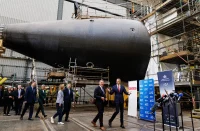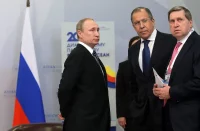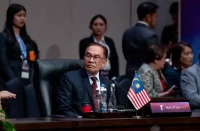Speaking at the Royal Institute of International Affairs in London recently, Turkey’s President Abdullah Gül said that the role of the West in global politics was gradually diminishing, and called for the creation of the new world order based on harmonious relations between the US and other world powers, including the EU and the BRICS nations (Brazil, Russia, India, China, South Africa).
Turkey will remain a NATO member and will continue seeking the EU membership, Mr. Gül said. He added, however, that Ankara will be implementing an independent and diverse foreign policy focusing on the creation of a harmonious world order, without hegemony of one separate state.
“We prefer to be realistic in terms of our relations with neighbors. The creation of a new group of countries basing on the former Ottoman legacy is not what our foreign policy is about…What we pursue is stability and cooperation in regions surrounding Turkey”, the Turkish leader said.
The ‘reset’ of Ankara – Moscow relations turned to be one of the key issues in the ‘No problems with neighbors’ diplomacy… Starting from 1921 both countries have lived through highs and lows, currently being a favorable moment. As of last year, Russia was Turkey’s second largest trade partner, while Turkey ranked seventh in terms of trade cooperation with Russia. Their bilateral trade stood at more than $25 billion, which was 29% higher than in 2009. Experts predict the further rise up to $38 billion in 2011.
“As of today, Turkey invests mainly in Russia’s real estate, banks, energy industry, as well as production of household appliances, glass industry and food and beer production. In all, about 2,000 Turkish firms are operating in Russia. As of the end of 2009, the amount of Turkish investment in Russia stood at $7 billion”, Turkey’s Ambassador to Russia, Aidyn Sezgin, said.
During his visit to Russia on 15-16 March, 2011, the Turkish Prime Minister Tayyip Erdoğan met the Russian leader Dmitry Medvedev and Prime Minister Vladimir Putin. The sides negotiated some joint projects in aviation and space exploration. A report released after the talks by Mr. Medvedev`s press-service said that the sides had agreed to jointly develop black metallurgy (Russian experts are going to help their Turkish colleagues at a metallurgy plant in Iskenderun), telecommunications industry, and production of household appliances.
Cooperation in energy industry is what Russia and Turkey focus most of all. The two countries have agreed to build Turkey’s first nuclear power station at Akkuyu Bay. The $20 billion project suggests the construction of four 1,2 gigawatt energy units with water-steam cycle. Geographically, Turkey is convenient for the transit of Russian energy supplies to Europe.
Ankara and Moscow have been negotiating the Samsun-Jeikhan oil pipeline. During the talks in Kazan the sides discussed the construction of this 555 km pipeline which is to connect the Black Sea coast and the Mediterranean. No agreement has been achieved so far. It appears that Turkey has been trying to take advantage of the situation while Moscow is facing obstacles to implementation of its Burgas-Alexandroupolis oil pipeline project due to the position voiced in Sofia.
Mr. Putin asked the Energy Ministry to examine the prospects of construction of a liquefied natural gas (LNG) plant on the Black Sea coast, and discuss the creation of LNG terminals with European partners.
After the signing of an intergovernmental protocol on gas cooperation last year, the Turkish media unanimously agreed that it would help Ankara receive more beneficial gas offers from Moscow. According to Sabah newspaper, Turkey`s state-run oil and natural gas company BOTAŞ is ready to discuss lower gas tariffs with Gazprom, including the revision of the take or pay principle.
Since August of 2006 Russia and Turkey have been implementing various projects in education, science, culture and sports. Last year the two countries` presidents signed a visa-free travel deal. Before the global financial crisis broke out in 2009, the number of Russian tourists visiting Turkey stood at 3 million per year. Even in 2009 Turkey welcomed 2.5 million tourists from Russia. Now Russian citizens may stay in Turkey without visa for a month (though this month Moscow suggested expanding this period up to 2 months).
Experts and diplomats in both countries agree that Moscow and Ankara have been living through the revival of cooperation on all fronts. In an interview with The Voice of Russia broadcasting company, the former chairman of the Turkish Institute for Strategic Studies, Yasin Aktai, said that Russia and Turkey experienced a chill in relations during the Cold War but in recent years this problem has almost completely disappeared. He added that neither Moscow nor Ankara approve the US hegemony.
Blooming cooperation between Turkey and Russia annoys many politicians in the West. After the US Congress Committee recognized mass killing of Armenians in the Ottoman Empire as genocide, Turkey ceased developing ties with the US in energy and defence industries, as well as in trade. The day following the commentary on genocide the Turkish delegation arrived in Moscow to discuss joint construction of a nuclear power plant and some other details concerning oil and gas pipelines.
According to Adrian Pabst, a lecturer in politics in the University of Kent, the UK, the Russian-Turkish cooperation fills the vacuum in the Caucasus and its strategic corridor which links the Persian Gulf with Afghanistan and Central Asia. It appears that Moscow and Ankara are reshaping the geopolitics of the Middle East and Eurasia.
Source: Strategic Culture Foundation














Comments